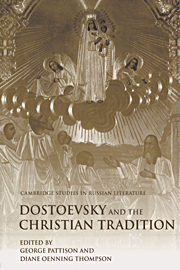Book contents
- Frontmatter
- Contents
- Notes on contributors
- Acknowledgments
- Notes on conventions and abbreviations
- Introduction: Reading Dostoevsky religiously
- PART I DOSTOEVSKY AND THE PRACTICE OF ORTHODOXY
- 1 Dostoevsky and the kenotic tradition
- 2 Dostoevsky's markings in the Gospel according to St John
- 3 Icons in Dostoevsky's works
- 4 Problems of the biblical word in Dostoevsky's poetics
- PART II DOSTOEVSKY AND CHRISTIAN THEOLOGY
- PART III READING DOSTOEVSKY RELIGIOUSLY: CASE STUDIES
- Bibliography
- Index
- CAMBRIDGE STUDIES IN RUSSIAN LITERATURE
1 - Dostoevsky and the kenotic tradition
Published online by Cambridge University Press: 02 December 2009
- Frontmatter
- Contents
- Notes on contributors
- Acknowledgments
- Notes on conventions and abbreviations
- Introduction: Reading Dostoevsky religiously
- PART I DOSTOEVSKY AND THE PRACTICE OF ORTHODOXY
- 1 Dostoevsky and the kenotic tradition
- 2 Dostoevsky's markings in the Gospel according to St John
- 3 Icons in Dostoevsky's works
- 4 Problems of the biblical word in Dostoevsky's poetics
- PART II DOSTOEVSKY AND CHRISTIAN THEOLOGY
- PART III READING DOSTOEVSKY RELIGIOUSLY: CASE STUDIES
- Bibliography
- Index
- CAMBRIDGE STUDIES IN RUSSIAN LITERATURE
Summary
In an often cited letter that he wrote in August 1879 to the editor Nikolai Lyubimov, Dostoevsky declared about the character of Zosima in The Brothers Karamazov:
He could not express himself in other language or in another spirit than that which I gave him <…> I took his person and figure from the Old Russian monks and prelates: together with deep humility [they had] limitless naive hopes for the future of Russia, about its moral and even political predestination. Didn't St Sergy and the metropolitans Pyotr and Aleksy really always, in this sense, have Russia in mind? (30, i, 102)
Dostoevsky's remarks to a large extent echo, both in general and in particular, comments made a decade earlier by the renowned nineteenth- century historian Vasily Klyuchevsky in a review of a new edition of saints' Lives. Klyuchevsky was convinced that such writings demonstrated the tremendous role played by holy personalities in Russian history:
not only the notorious Moscow Ivans gave the state such vitality <…> their material creation was also served by the best moral forces of the people, in the form of Pyotr and Aleksy, Sergy, and many others. Perhaps we would look more seriously at ourselves and at our future, if we knew and appreciated better these moral forces that laboured for us in the past.
Dostoevsky and Klyuchevsky regarded the symbiosis between medieval Orthodoxy and princely circles bent on the unification of the Russian lands in a decidedly romantic light.
- Type
- Chapter
- Information
- Dostoevsky and the Christian Tradition , pp. 31 - 40Publisher: Cambridge University PressPrint publication year: 2001
- 2
- Cited by

